Less than two years after its publication, the young adult novel The Hate U Give by Angie Thomas fast tracks its way to the big screen. Already it has become part of the contemporary canon, with New York magazine declaring, “No novel has proven the vitality of YA as an art form more than this debut about a teenage girl’s entry into Black Lives Matter.”
Though it is a character-driven story, the most valuable player in the page-to-screen transfer is inevitably the adapter, at least for those who have devoured the book and want to see if the novel’s determined and inviting voice still echoes. That task fell into the hands of the late veteran writer Audrey Wells (Under the Tuscan Sun, which she also directed). Wells died earlier this month, a day before the film’s release.
The adaptation of Thomas’s novel was arguably the most politically upfront film at the recent Toronto International Film Festival, where it had its world premiere. That’s saying something, considering other films that screened there included Paul Greengrass’s 22 July, which unnervingly retold the massacre of 77 people in Sweden in 2011 by a right-wing extremist, and Michael Moore’s Fahrenheit 11/9. Additionally, there were at least two other films that, along with The Hate U Give, featured unarmed black men being killed by cops: Monsters and Men and Widows.
The filmmakers certainly did not water down Thomas’s social justice theme, opening with an African American father, Maverick, or Mav (Russell Hornsby), explaining how to respond to the police to two young children, a boy and a girl, Starr. (From the book: “Keep your hands visible. Don’t make any sudden moves. Only speak when they speak to you.”) And apart from some recent documentaries, this is one of the few films to include a recitation of the Black Panthers’ Ten-Point Program.
The narrative is basically the same: Starr (Amandla Stenberg), now 16 years old, witnesses the death of her childhood friend and first crush, Khalil (Algee Smith, the most charismatic actor here, despite his brief screen time), at the hands of a white policeman. Khalil is driving her home from a weekend party when he’s pulled over for a broken taillight. Khalil gets out of car, as ordered by the officer, but goes back into the car to check on an Starr when the cop fires several shots without ordering the teenager to freeze or to put his hands up. The officer mistook Khalil’s hair brush for a gun.
Starr keeps her identity as the eyewitness secret from her friends at her nearly all-white private high school, where she acts like, in her own words, Starr, Version 2. She utters no slang, tries to look like she’s not from the “hood,” and acts neither confrontational nor angry. Unbeknownst to her father, Starr has a white boyfriend, classmate Chris (K.J. Apa, Riverdale’s Archie). As a grand jury deliberates whether or not to press charges against the officer who killed Khalil, the case becomes a high profile media story, and her school comes to Khalil’s cause, in a way, as students walk out of classes to protest the killing. However, most are doing so just to cut class.
Not surprisingly, there are cuts and compressions in the translation from page to screen. Some characters are mashed together, while others go missing. (That would include Starr’s blunt and irascible Nana; sorry readers.) One change that draws out the suspense further than in the novel is the introduction of Chris to Starr’s dad. Here, Chris picks up Starr for the prom and Mav mistakes him for the limo driver, not perceiving that he could be his daughter’s date.
But what the screenplay crucially tones down is an essential element of Thomas’s prose: Starr’s sense of humor. Thomas balances her well-structured story with conversational asides, without sounding glib or downplaying the seriousness of Starr’s circumstances. The book is often quite funny, such as the biting one-upmanship between Starr’s parents, who even bicker with each other while taking turns saying prayer at the dinner table. This may be surprising to those who have only seen the movie. Although much of the dialogue is lifted from the book, Stenberg’s narration is more somber and matter-of-fact than conversational, and one of the reasons this becomes a message movie through and through.
Another alteration that does not lend the film any nuance is the personality change of Starr’s beloved Uncle Carlos (Common), who helped raised her while Mav was incarcerated. Carlos is now an apologist for police misconduct, lessening one of Thomas’s messages: not all police officers are bad. In the book, Carlos is an example of a good cop, who stands up to other officers defending the shooting. (Another takeaway from the novel: where you live is not who you are.)
The film is more closely aligned to the book when it centers on Starr’s family, a portrayal of home as a refuge where everyone looks out for each other, despite the nitpicking and arguing at the breakfast table. Actress Regina Hall (Support the Girls) continues her winning streak this year as Starr’s mom, a voice of caution and support.
But the scenes set in Starr’s high school feel rushed and unmotivated. Her school friendships are perhaps one of the most relatable aspects of Thomas’s narrative to her target audience. Instead of tying up the loose strings involving Starr’s childhood friends Hailey (Sabrina Carpenter) and Maya (Megan Lawless), the adaptation emphasizes action and the threat of violence in the climax, when protestors hit the streets and cops attempt to disrupt them. Rioting ensues, along with a melodramatic showdown that is found nowhere in the book.
Thomas’s story is more involving because it places individuals front and center. Because Starr is less enmeshed in her various relationships, the movie ultimately becomes more about the slogans.

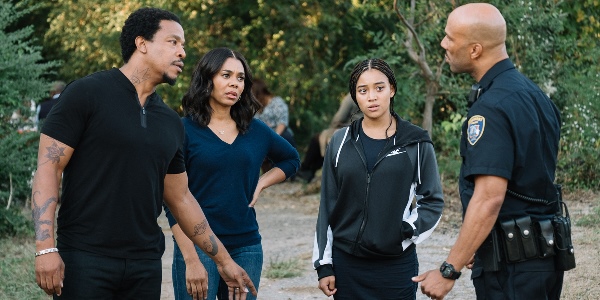
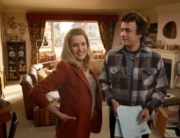

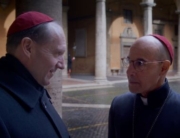
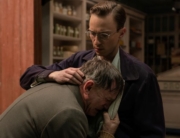
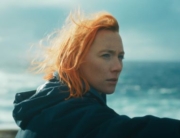
I wish reviewers would notice that they young guy deliberately wanted to provoke / play a prank on a police-officer pulling out the hair-brush as if it was a gun! If a white young guy had done that and a black police officer had shot him dead, what would people have said then? Oh, I know: “In our times of gun-violence a young guy tries to make a police officer think he has a gun in his hand just after having been pulled over … it’s his own fault that he got shot.” The bias in reviewing and recaping this film is nauseating. Says me, a black woman.